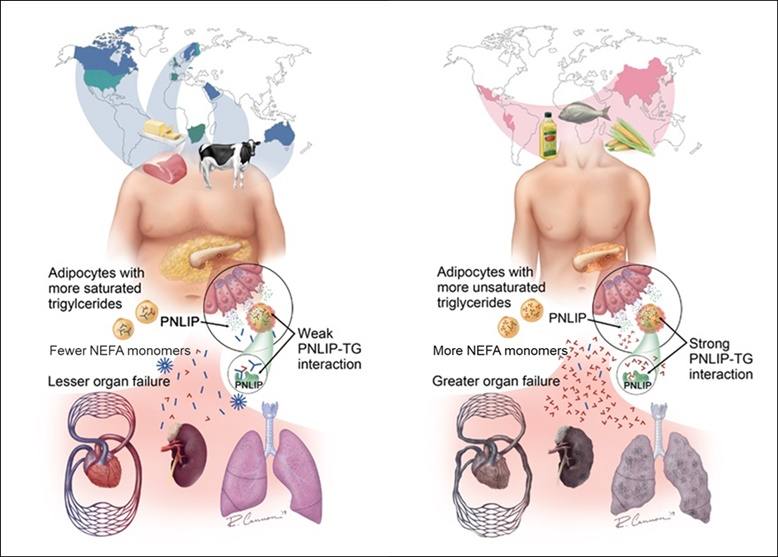I found this study particularly interesting, not entirely because of its main topic, but more for its side findings which directly confirmed Ray Peat’s theories. This study finds that the severity of acute pancreatitis(and other obesity associated diseases) is determined by the amount of stored polyunsaturated fatty acids. It also confirms that lipolysis preferentially releases pufas from adipocytes(as Ray has repeatedly stated). It find that the body preferentially accumulates polyunsaturates(as Ray has repeatedly stated). And finally, it finds that saturated fat interferes/inhibits lipolysis even in obesity.

 advancingthescience.mayo.edu
advancingthescience.mayo.edu
“In our research, we found that when a person is stricken by acute pancreatitis their stored body fat rapidly breaks down in a way that can be deleterious if its composition is more unsaturated.”
“The researchers believe that what is referred to as the obesity paradox, or a perceived higher body mass index (BMI) threshold for severe acute pancreatitis in some patients, may be explained by composition of a person's visceral fat accumulated before the disease. The rapid breakdown of this fat and the action of the released unsaturated or essential fatty acids during acute illness worsen the disease course. Their findings may also hold true for other serious conditions with sudden and rapid progression in which the 'obesity paradox' is described, he says.”
“They found that in places where diets are typically low in saturated fats – worse outcomes for people with acute pancreatitis were noted in leaner populations or patients with lower BMIs, compared to countries such as the U.S., where the average diet includes much more saturated fat and the population tends to have a higher BMI.”
“Linoleic acid consumption has increased substantially since the 1950s, says Dr. Singh. With that, the fat stores in the body, which are attacked during pancreatitis, have become enriched in linoleic acid. He also cites previous research showing the level of linoleic acid in fat stores to average about 25% in patients with severe pancreatitis, which is more than twice what used to be the norm in the U.S.”
“Using mouse models, they found that the type of dietary fat (~70% saturated or unsaturated between two groups) led to changes in visceral triglyceride composition, increasing the percentage of saturated or unsaturated body fats accordingly. When acute pancreatitis was initiated, lean models with high unsaturated fat intake had worse outcomes than the obese models with high saturated fat intake.”
“Dr. Singh explains that stored unsaturated fat – or what he calls 'oily fat' – is broken very rapidly into fatty acids, whereas saturated, or 'buttery fat', is slow to break down. The unsaturated fatty acids are also more stable in the blood, so the effect is multiplied. The result? Excess unsaturated fatty acids, which are more cytotoxic than their saturated counterparts, and during an acute illness, can be deadly.
This process of breaking down visceral fat into fatty acids is called lipolysis. And linoleic acid led more readily to that breakdown than the saturated fat used in the study diet (palmitic acid).”
“"Because by nature unsaturated or essential fatty acids are more water stable at warm temperatures, they are able to more freely accumulate and spread through the body, causing damage to individual cells and whole organ systems," says Dr. Singh. "We believe that could contribute to cytokine storms and organ failure in previously healthy people."”
“In an apparent paradox, we found that saturated fatty acids interfered with this lipolysis, and when released were unstable on their own. This caused less cell injury," says Dr. Singh. "When we introduced saturated dietary fats, despite the mice weighing more, and having more (saturated) fat; these mice had reduced breakdown of visceral fat into the fatty acids that led to worse outcomes."”

Body fat investigation provides insights for ‘obesity paradox’ » Advancing the Science
The Obesity Paradox Excerpted from a 2009 Mayo Clinic Proceedings article, The Obesity Paradox: Perception vs Knowledge.
 advancingthescience.mayo.edu
advancingthescience.mayo.edu
“In our research, we found that when a person is stricken by acute pancreatitis their stored body fat rapidly breaks down in a way that can be deleterious if its composition is more unsaturated.”
“The researchers believe that what is referred to as the obesity paradox, or a perceived higher body mass index (BMI) threshold for severe acute pancreatitis in some patients, may be explained by composition of a person's visceral fat accumulated before the disease. The rapid breakdown of this fat and the action of the released unsaturated or essential fatty acids during acute illness worsen the disease course. Their findings may also hold true for other serious conditions with sudden and rapid progression in which the 'obesity paradox' is described, he says.”
“They found that in places where diets are typically low in saturated fats – worse outcomes for people with acute pancreatitis were noted in leaner populations or patients with lower BMIs, compared to countries such as the U.S., where the average diet includes much more saturated fat and the population tends to have a higher BMI.”
“Linoleic acid consumption has increased substantially since the 1950s, says Dr. Singh. With that, the fat stores in the body, which are attacked during pancreatitis, have become enriched in linoleic acid. He also cites previous research showing the level of linoleic acid in fat stores to average about 25% in patients with severe pancreatitis, which is more than twice what used to be the norm in the U.S.”
“Using mouse models, they found that the type of dietary fat (~70% saturated or unsaturated between two groups) led to changes in visceral triglyceride composition, increasing the percentage of saturated or unsaturated body fats accordingly. When acute pancreatitis was initiated, lean models with high unsaturated fat intake had worse outcomes than the obese models with high saturated fat intake.”
“Dr. Singh explains that stored unsaturated fat – or what he calls 'oily fat' – is broken very rapidly into fatty acids, whereas saturated, or 'buttery fat', is slow to break down. The unsaturated fatty acids are also more stable in the blood, so the effect is multiplied. The result? Excess unsaturated fatty acids, which are more cytotoxic than their saturated counterparts, and during an acute illness, can be deadly.
This process of breaking down visceral fat into fatty acids is called lipolysis. And linoleic acid led more readily to that breakdown than the saturated fat used in the study diet (palmitic acid).”
“"Because by nature unsaturated or essential fatty acids are more water stable at warm temperatures, they are able to more freely accumulate and spread through the body, causing damage to individual cells and whole organ systems," says Dr. Singh. "We believe that could contribute to cytokine storms and organ failure in previously healthy people."”
“In an apparent paradox, we found that saturated fatty acids interfered with this lipolysis, and when released were unstable on their own. This caused less cell injury," says Dr. Singh. "When we introduced saturated dietary fats, despite the mice weighing more, and having more (saturated) fat; these mice had reduced breakdown of visceral fat into the fatty acids that led to worse outcomes."”
